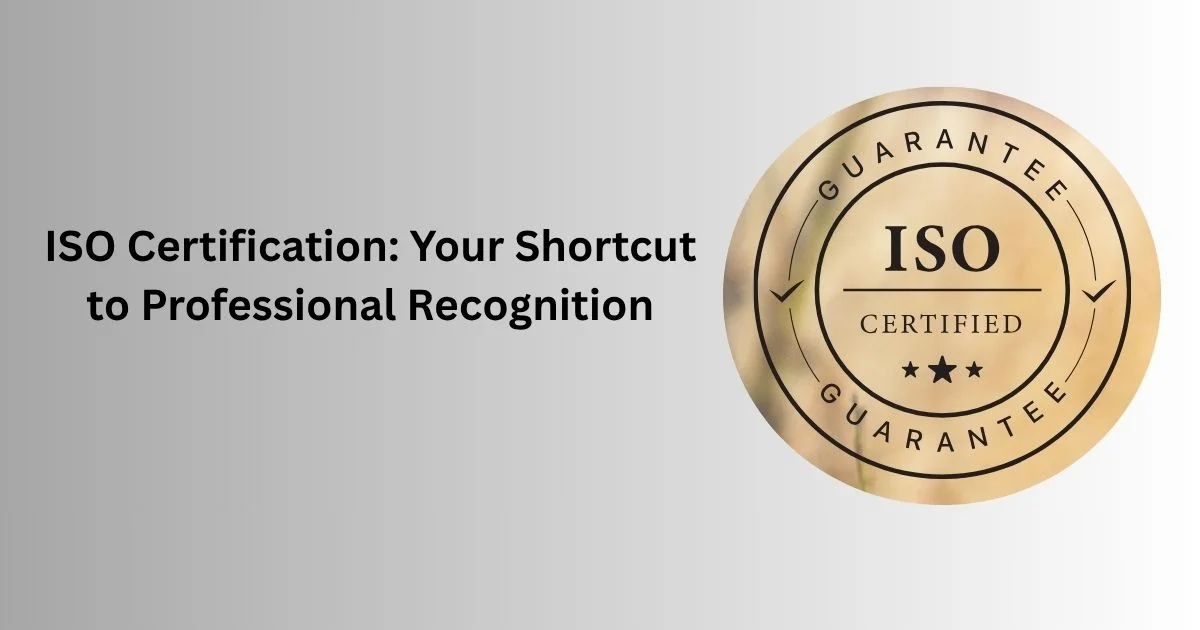In today’s competitive business environment, establishing trust and credibility is essential for growth and success. One of the most effective ways to demonstrate your organization’s commitment to quality, safety, and professionalism is through ISO Certification. ISO standards are globally recognized, providing businesses with a framework to improve efficiency, consistency, and customer satisfaction. ISO certification is not merely a formality—it is a strategic tool that can elevate your brand, open new market opportunities, and give your business a professional edge over competitors.
What is ISO Certification?
ISO (International Organization for Standardization) develops and publishes international standards to ensure that products, services, and systems are safe, reliable, and of high quality. ISO certification confirms that an organization adheres to these standards.
There are several ISO standards designed for different industries and business needs:
Popular ISO Standards
-
ISO 9001 (Quality Management System): Focuses on maintaining consistent quality and improving customer satisfaction.
-
ISO 14001 (Environmental Management System): Helps organizations manage environmental responsibilities efficiently.
-
ISO 45001 (Occupational Health & Safety): Ensures workplace safety and reduces the risk of accidents.
-
ISO 27001 (Information Security Management): Provides guidelines for data protection and information security.
-
ISO 22000 (Food Safety Management): For businesses in the food industry to ensure safe and hygienic food handling.
By choosing the right ISO standard, businesses can align operations with international best practices and gain a competitive advantage.
Why ISO Certification is Important
Builds Professional Credibility
ISO certification acts as a stamp of trust for customers, partners, and investors. It shows that your business follows standardized procedures and maintains quality, reliability, and safety.
Boosts Marketability
Businesses with ISO certification often find it easier to attract clients, participate in tenders, and expand into new markets. Many multinational clients require suppliers to be ISO-certified before initiating contracts.
Improves Operational Efficiency
Implementing ISO standards involves streamlining processes, reducing errors, and optimizing resources. This not only saves time and costs but also improves productivity and performance.
Encourages Continuous Improvement
ISO emphasizes regular audits and performance monitoring. This helps businesses continually enhance their systems, processes, and product quality, fostering a culture of excellence.
Benefits of ISO Certification
1. Strengthened Customer Trust
A certified business is more likely to earn customer confidence. Clients trust that your products or services meet international standards of quality and safety.
2. Global Recognition
ISO certification is recognized worldwide. It makes your business credible in international markets, enabling you to expand globally and collaborate with overseas clients.
3. Compliance with Regulations
Many ISO standards help businesses comply with national and international laws and regulations, reducing legal risks and ensuring smooth operations.
4. Enhanced Brand Image
ISO certification improves brand perception. Businesses that prioritize quality, safety, and environmental responsibility stand out in a crowded marketplace.
5. Access to New Opportunities
ISO-certified companies can participate in government and corporate tenders, supply chains, and other business opportunities that require certification.
How ISO Certification Works
Step 1: Identify the Right ISO Standard
Determine which ISO standard best suits your business operations and objectives. Each standard caters to different aspects of quality, safety, or management systems, so choose one that aligns with your goals.
Step 2: Access the Official Certification Portal
Visit the official ISO certification website to begin your registration and application process.
Step 3: Complete the Application Form
Fill in the required details carefully in the online form, ensuring all information about your business is accurate.
Step 4: Submit Your Application
After reviewing all details for accuracy, submit the form to initiate the certification process.
Step 5: Make the Payment
Pay the applicable fees online. These nominal charges cover the application and processing of your certification request.
Step 6: Certificate Confirmation
A certified ISO consultant will review your application and confirm the ISO standard you are applying for.
Step 7: Receive Your ISO Certificate
Once approved, your ISO certificate will be issued and sent directly to your registered email, officially recognizing your compliance with the chosen standard.
Industries That Benefit from ISO Certification
-
Manufacturing: Ensures consistent product quality and reduces production errors.
-
IT & Software: Strengthens data security, reliability, and client confidence.
-
Healthcare: Improves patient safety, quality of care, and compliance with health regulations.
-
Food Industry: Guarantees food safety, hygiene, and compliance with global standards.
-
Construction & Engineering: Enhances project management, safety protocols, and efficiency.
ISO certification is versatile and applicable across multiple industries, from small startups to large multinational corporations.
Long-Term Impact of ISO Certification
Strengthens Reputation
ISO certification enhances credibility and positions your business as a professional and trustworthy organization.
Encourages Innovation
The process of continual audits and improvements fosters innovation in processes, services, and products.
Increases Profitability
Efficient operations, reduced waste, and higher customer satisfaction contribute to long-term profitability and business growth.
Facilitates Global Business
ISO-certified businesses are more competitive internationally, allowing easier entry into foreign markets and collaborations with global partners.
Also Read: How to get the ISO(9001) certification process in India
Conclusion
ISO certification is more than just a certificate—it is a strategic investment in your business’s credibility, growth, and global recognition. By adhering to international standards, organizations can improve processes, ensure quality, maintain compliance, and gain the trust of clients and partners worldwide. Whether you are a small business aiming to establish trust or a large enterprise seeking international expansion, ISO certification is your shortcut to professional recognition. It demonstrates your commitment to excellence, strengthens your brand image, and opens doors to new business opportunities. Take the step today, get ISO certified, and position your business as a trusted, professional, and globally recognized organization.






